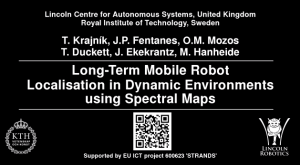Dr Astrid Weiss from Technical University Vienna, will be presenting in the SoCS research seminar. Her work is at the crossroads of robotics, computer science, Human Computer Interaction, and social sciences; investigating robotic applications in public space, elderly care and factory settings.
This is a research seminar open to attendees across the university, in particular interesting for computer science, engineering, and and social sciences.
Date/Time: 24/4/2015 10am
Place: MC2201
Astrid Weiss, TU Wien
Users in focus – Creating service robots for and with people
Abstract
User involvement is a widely accepted principle in the development of usable and acceptable technology. However, it is still a vague approach in the research field of human-robot interaction. I share with you my experiences on the nature of user involvement and how it can be integrated in the development of service robots, providing examples from different contexts (elderly care, public space, factory environments, etc.) and user groups (children, older adults, naive users, expert users, etc.). I’ll present reflections from a social scientists working on human-robot interaction from several years of user studies and field work.
CV
Astrid Weiss is a postdoctoral research fellow in HRI at the Vision4Robotics group at the ACIN Institute of Automation and Control at Vienna University of Technology (Austria). Her current research focuses on Human-Robot Cooperation in vision-based tasks and service robots for older adults. Her research is inspired by Theory of Mind and the approach of transferring findings from human-human studies to human-robot interaction in order to improve intuitiveness and acceptance. Her general research interests are user-centered design and evaluation studies for Human-Computer Interaction and Human-Robot Interaction with a focus on in-the-wild studies and controlled experiments. She is especially interested in the impact technology has on our everyday life and what makes people accept or reject technology. Before her position in Vienna she was a postdoc researcher at the HCI&Usability Unit, of the ICT&S Center, University of Salzburg, Austria and at the Christian Doppler Laboratory on “Contextual Interfaces” at University of Salzburg. Astrid holds a master’s degree in sociology and a PhD in social sciences from the University of Salzburg. During her studies she specialized on methodologies of empirical social research and applied statistics. From September 2011 until January 2012 she was on a short-term sabbatical at the University of Amsterdam, Intelligent Systems Lab and the University of Twente, HMI group to work with Vanessa Evers on Cross-Cultural studies in Human-Robot Interaction.
